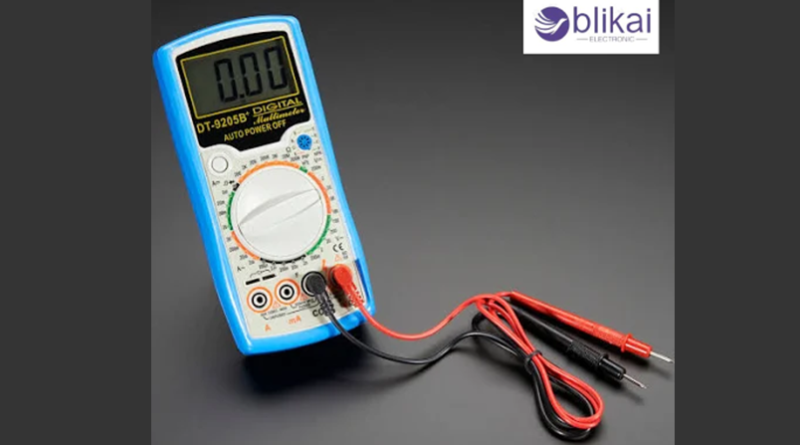Troubleshooting Fluctuating Multimeter Readings
What is a Multimeter?
A multimeter can measure voltage, current, and resistance. It can also test circuit components or wires for continuity or resistance. Multimeters are used by electricians, technicians, and engineers to diagnose electrical equipment and wiring problems.
Multimeter Parts
An average multimeter consists of three components: a selector switch, probes or leads for attaching to components and a display. Readings on the meter are affected by voltage drops across components. There may be a problem with the circuit itself if this reading keeps jumping around unpredictably.
Multimeter Reading Keeps Jumping: What Should I Do?
Finding what makes a multimeter reading jump or fluctuate is complicated. First, the concerned technician must make sure that all the connections are tight and properly connected. If this does not solve the problem, then further investigation should be done.
The multimeter will fluctuate if a connection somewhere in a circuit is loose or faulty. If you suspect corrosion or breaking or fraying in your connections or wires, they need to be inspected carefully. Often, in cases like these, replacing faulty wiring and making sure the connections are tight may resolve the problem.
If there is no physical damage, the next thing to investigate would be that the multimeter isn’t picking up other sources of electrical interference. If the microwave or other appliance is disconnected and is not interrupting other components in the circuit, plug only the multimeter into the wall and check again. If it is still jumping around, you might have to investigate further for other types of interference.
Before taking any measurements with a multimeter, make sure it is properly calibrated. A multimeter that is of poor quality or has not been calibrated will give unreliable results.
Fluctuating readings of the multimeter may again result from changes in moisture or atmospheric conditions. It may be necessary to use a shielded cable or switch to a different type of multimeter in these instances as rechecking the connection or wiring may not be effective.

Reasons Why Your Multimeter Reading Keeps Jumping
Incorrect Connection
Test leads should be properly connected at both ends if you are using them during readings. Multimeter readings can jump erratically if the connection is incorrect or loose.
Components of Lower Quality
A poor quality component used in the manufacturing of your multimeter could be the cause of inaccurate or jumping readings. You should replace the instrument with one of better quality if this is the case.
Unstable Power Supply
Make sure that the voltage supplied by an external power source is stable across all cycles if your multimeter has an AC input jack. It is possible for erratic readings to be caused by fluctuating external power supplies.
Low Battery
Its LCD screen continues to jump since the battery is low in your multimeter. A voltage multimeter reading that jumps around is usually caused by this. Your battery may need to be replaced in order to resolve this issue.
My Multimeter Does Not Read Correctly. Why Is That?
Several factors could be causing your multimeter readings to jump around. Multimeter problems usually come from faulty connections between the device or circuit and the multimeter. Connectors should be tight and wires should be in good condition. Other electrical devices or power lines may also cause interference in your area. You may need to replace the multimeter’s battery in some cases.
Why Does My Voltage Jump Around?
Low battery charge is quickly replenished with a slight increase in voltage. Overcharging is prevented by lowering the voltage when the charge is high. The voltmeter gauge on the vehicle may show an increase or decrease in voltage. Normally, this happens.
What Causes False Readings on a Multimeter?
There are several factors that can cause false readings. The leads of the multimeter can become disconnected during measurement, resulting in false readings, and nearby electronic devices can also cause interference, as well as a dead battery within the multimeter. Furthermore, an improperly calibrated multimeter can produce inaccurate results
How Do I Fix My Multimeter Reading Keeps Jumping?
Fix any frayed or damaged leads and connect all leads securely. Ensure that contact points are not corroded. A cotton swab and rubbing alcohol can be used to clean any corroded contacts. Minimize interference caused by nearby electrical sources. You can also try replacing the battery in your multimeter if you are still experiencing problems.
Final Verdict
You may encounter this problem if your multimeter reading keeps jumping. Probes and leads should be in good contact with terminals or components when testing them. It is possible that external electromagnetic fields or other environmental noise sources are affecting the readings if all of these elements are in order.
Ensure nearby appliance motors do not create electrical noise by using shielded leads, relocating your work area, and using shielded leads. You should be able to get accurate readings from your multimeter once you have addressed possible interference causes and checked for faulty equipment.
